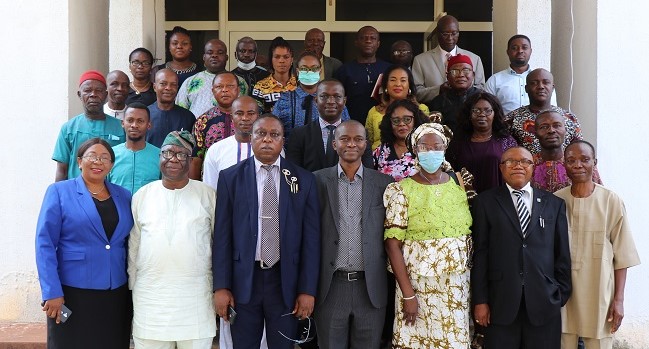Concerned by the debilitating effect of food insecurity in Nigeria, the Resource and Environmental Policy Research Centre (REPRC) Environment for Development (EfD) Nigeria, University of Nigeria, has called for a government policy to enable farmers embrace Climate Smart Agriculture in order to solve the current food crisis.

Speaking at the 2020 Policy Day event organised by the REPRC-EfD Nigeria, in collaboration with Gender and Development Policy Centre (GEN-CENT), the Vice-Chancellor of the University of Nigeria, Professor Charles Igwe, stated that the high prices of food items in the country was enough reason for government at all levels.
“I concede that social political factors and the COVID-19 pandemic are undertones for the current food crises, I believe, very strongly, that the major culprit is climate change,” Igwe said.
The Vice-Chancellor stated that the impact of climate change on the agricultural system could not be wished away. “It requires our concerted effort in the areas of research, policy formulations, farmers’ education and the practice of climate smart behaviors,” he noted.
He said that the EfD Nigeria Policy Day had provided platform for policymakers, farmers and other relevant stakeholders to brainstorm on policy decisions for gender-inclusive climate smart agricultural practices for the attainment of food security in Nigeria generally and the Southeast region in particular.
The Director of REPR-EfD Nigeria, Dr Nnaemeka, said that his Centre organised the Policy Day to share findings of the Centre’s research on Climate Smart Agriculture and Food Security with stakeholders with the hope of stimulating their passion for a policy decision that would enable farmers adopt practices that would increase food production.
Presenting findings on the research titled “Determinants and Impact of use of Multiple Climate Change Smart Agricultural Practices: Panel Data Evidence from Nigeria” Dr Chukwuone said that there were evidence that farmers who adopt climate smart agricultural technologies experience improved crop yield and make more income.
He said that land tenure security predisposes farmers to adopt climate smart agricultural practices and that households who own and use a mobile telephone were more likely to embrace climate smart agricultural practices, including use of organic fertiliser, and other soil fertility management processes.
“This suggests that improving communication infrastructure and access to information is important to enhance the use of climate change adaptation practices through facilitating timely market and other production and changing climate information,” Chukwone said.
The study shared by Dr Chukwuone recommended that the Federal Government should use the on-going land reform initiatives to enhance land tenure security, especially for women in order to stimulate the adoption of Climate Smart Agriculture practices.
Among other things, the study also recommended that the government, through the Ministry of Agriculture and relevant agencies like the Crop research institutes and the ADP, should carefully design and target multiple Climate Smart Agriculture technologies suited to specific agro-ecological zones in the country.
Professor Emmanuel Oladipo, Chairman of REPRC-EfD Nigeria Policy Advisory Panel, applauded the Centre for its research and policy contributions to Nigerian environmental and agricultural sectors.
He said it was high time Nigerian policymakers should enact policy decisions that should match its food production with its population growth. “Nigerians give birth to about 7,000,000 children annually, but its contribution to the feeding of those children is inversely proportional,” the don said.
